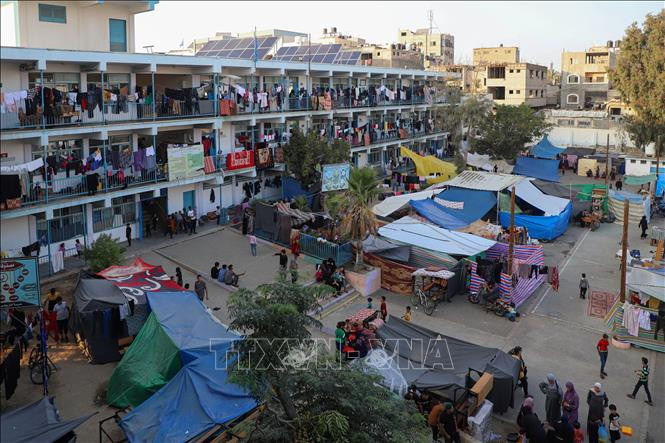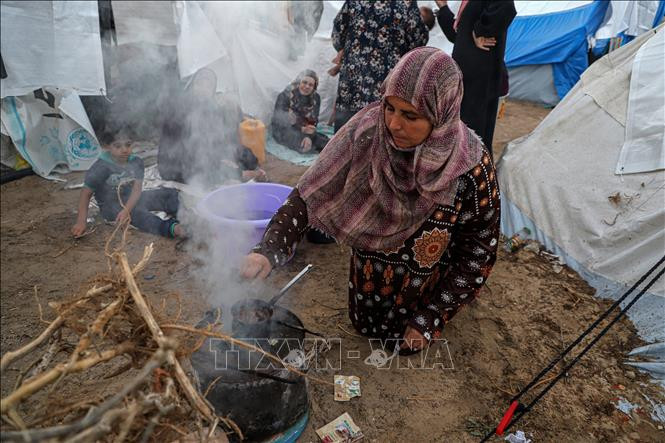Mobile phone and internet services have been shut down across the Gaza Strip due to a lack of fuel for backup generators.

According to the BBC, telecommunications companies Paltel and Jawwal announced that all energy sources maintaining the telecommunications network had run out.
“We regret to announce that all telecommunications services in the Gaza Strip have been suspended as all energy sources to maintain the network have been exhausted and fuel is not allowed to enter,” Paltel said in a statement released on the afternoon of November 16.
Internet watchdog NetBlocks confirmed live figures showing a severe internet outage in Gaza, with most residents unable to use telecommunications services.
The United Nations says the loss of telecommunications services could jeopardize civil order and hamper aid efforts.
Israel has blocked all but one fuel shipment to Gaza since the start of its war with Hamas five weeks ago.
The Israeli government has defended its move to block fuel supplies into Gaza during its ground campaign there, saying it was concerned Hamas could take the fuel and use it for military purposes.
A ship carrying 23,000 liters of diesel passed through Egypt on November 15, but Israel only allowed it to refuel trucks carrying United Nations aid.
Other vital services have been shut down due to similar problems, including hospitals, water pumps, desalination plants, wastewater treatment facilities and bakeries.
According to a BBC correspondent at the scene, all communications across Gaza were cut off on the evening of 16 November. He said it would be extremely difficult to get information about what was happening on the ground elsewhere, especially in places like Al-Shifa Hospital in Gaza City, where Israeli forces were conducting an operation for the second day running.
Philippe Lazzarini, head of the UN Relief and Works Agency for Palestine Refugees (UNRWA), said he was concerned that the situation could further disrupt civil order. “These are signs of a situation where there is a loss of telecommunications services and no one can communicate with anyone anymore… That causes more anxiety and panic. This could provoke or change civil order in the Gaza Strip. And if civil order breaks down completely, it will be difficult for us to operate in an environment where there is no minimum order,” he told a news conference in Geneva.
Prolonged communications blackouts can hide atrocities, prevent accountability, undermine humanitarian efforts, and put lives at risk, Human Rights Watch warned on November 15.
Mr Lazzarini also said there was a deliberate attempt to stifle UNRWA's work in Gaza, warning that the agency could have to suspend operations altogether if fuel supplies ran out.
UNRWA is hosting 813,000 displaced people and needs at least 160,000 litres of fuel per day to maintain basic operations.
“If fuel is not supplied, people will start dying from lack of fuel. Exactly when, I don’t know. But sooner or later,” Mr. Lazzarini warned.
Meanwhile, Cindy McCain, head of the United Nations World Food Programme (WFP), said food and water supplies were virtually non-existent and only a fraction of what was needed was getting across the border. “With winter fast approaching, people living in unsafe and overcrowded shelters and lacking clean water are facing an imminent risk of starvation,” she warned.
The fuel shortage has also paralyzed distribution and humanitarian operations, including the delivery of food assistance, according to WFP. Even as trucks arrived from Egypt and unloaded supplies in the Gaza Strip on November 15, WFP was unable to reach civilians in shelters because there was not enough fuel for the distribution vehicles.

However, Colonel Moshe Tetro, a spokesman for COGAT (the Israeli Ministry of Defence's body overseeing policy in the Palestinian territories), told the BBC: "As far as I know, there is no shortage of food and no shortage of water in Gaza."
Tetro said Israel was doing its part to facilitate the delivery of aid and that the number of trucks passing through Egypt was increasing daily. According to the United Nations, 1,139 aid trucks have arrived since October 21, compared to an average of about 500 a day before the war.
Tetro also stressed that Israel was doing everything possible to reduce civilian casualties, including asking residents in northern Gaza to evacuate south. However, Israeli Prime Minister Benjamin Netanyahu said the effort to reduce civilian casualties had failed because Hamas prevented people from reaching safer ground.
Many of the 1.5 million displaced have fled to Khan Younis, which had 300,000 people before the war and has now tripled in population.
On November 16, it was reported that Israeli forces dropped leaflets calling on people to evacuate four towns east of the city - Bani Shuhaila, Khuzaa, Abasan and Qarara - where tens of thousands of people are taking shelter.
A UNRWA spokesman said the south was not safe at all and an Israeli expansion of a ground offensive into the area would be bad news.
According to Tin Tuc newspaper